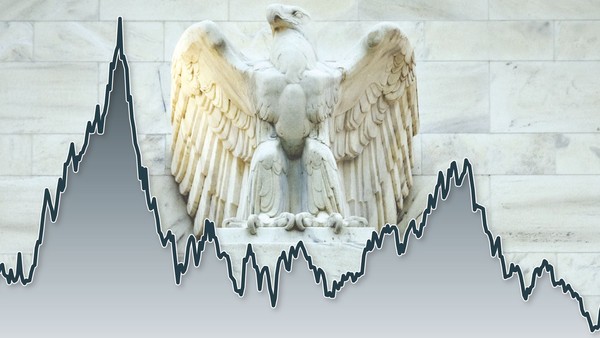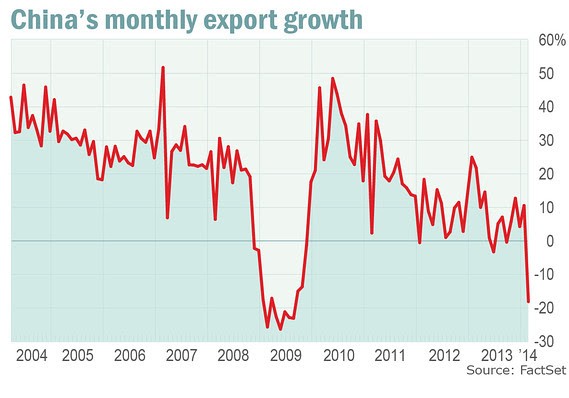Emerging Markets Crack as $ Funds Unwind Currencies Bloomberg Business
Post on: 30 Март, 2015 No Comment

The World Bank lowered its forecast this month for China’s growth in 2013 to 7.7 percent, which would be the slowest since 1999, from an 8.4 percent estimate in January. Photographer: Tomohiro Ohsumi/Bloomberg
June 20 (Bloomberg) — Investors are pulling money from emerging markets at the fastest pace in two years as slowing economic growth and the prospect of less global stimulus sink stocks, bonds and currencies from India to Brazil.
More than $19 billion left funds investing in developing-nation assets in the three weeks to June 12, the most since 2011, according to EPFR Global. Foreign investors dumped an unprecedented $5.6 billion of Brazilian stocks and $3.4 billion of Indian bonds this month, exchange data show. The tumble that has sent JPMorgan Chase & Co.’s emerging-currency index down 1.4 percent this quarter extended today as the rupee and Turkish lira hit record lows.
“These are pre-quake tremors: something big is coming,” Stephen Jen, the co-founder of hedge fund SLJ Macro Partners LLP, said in a phone interview from London on June 12. “There’s tremendous deceleration in emerging markets. You may see crisis-like price actions without having a crisis.”
The reversal of the $3.9 trillion of cash that flowed into emerging markets the past four years has been compounded by popular protests in Turkey and Brazil challenging government policies on everything from fighting inflation to developing infrastructure. China, the largest developing economy, is forecast by the World Bank to expand at the slowest pace since 1999 this year, while current-account deficits in Indonesia, Brazil and Chile have grown to the widest in a decade.
“While cyclical opportunities will come and go, the era of structural outperformance for EM is probably over,” Dominic Wilson, the chief markets economist at New York-based Goldman Sachs Group Inc. who predicted the rise of the biggest emerging markets in 2003, wrote in a report dated yesterday.
Cheap Money
Speculation that the Federal Reserve and European Central Bank will end the flood of cheap money is contributing to the pullout. Fed Chairman Ben S. Bernanke said yesterday that policy makers may “moderate” their pace of bond purchases later this year, reducing money being pumped into the U.S. economy, some of which has found its way to other countries.
India’s rupee weakened as much as 2.2 percent against the dollar today to a record 59.98, and closed at 59.575 in New York. The Reserve Bank of India intervened to support the currency, according to three traders who asked not to be identified, while Raghuram Rajan, the chief economic advisor to the finance ministry, said in New Delhi that the Asian nation will take “appropriate” steps to contain the rupee’s volatility.
Ringgit Falls
The Chilean and Colombian pesos tumbled at least 2 percent, the biggest selloff in two years. The lira touched an all-time low of 1.95 per dollar. Malaysia’s ringgit depreciated 1.6 percent, the biggest drop since November 2011. South Africa’s rand fell 0.6 percent, approaching the weakest level in four years. Poland’s zloty sank as much as 2 percent versus the euro to the lowest in a year.
MSCI Inc.’s Emerging Markets stock index retreated the most in 20 months today and was down 14 percent this year, compared with a 13 percent advance in the Standard & Poor’s 500 Index. The developing-nation measure is trailing the U.S. benchmark by the most since 1998.
Peru’s Lima General Index has led declines among 21 developing-nation stock indexes tracked by Bloomberg, with a 24 percent drop this year. Brazil’s Ibovespa index fell 21 percent and the Hang Seng China Enterprises Index sank 19 percent.
Turkey’s main stock index, the Borsa Istanbul National 100, sank more than 20 percent from its May peak into what’s known as a bear market. The Philippine Stock Exchange Index was the biggest gainer this year, advancing 8.8 percent.
OGX’s Tumble
OGX Petroleo & Gas Participacoes SA, the Brazilian oil explorer controlled by billionaire Eike Batista, slipped 82 percent this year, the steepest drop in the MSCI Emerging Markets gauge. Sao Paulo-based utility Eletropaulo Metropolitana SA retreated 62 percent and China Foods Ltd. a Hong Kong beverage maker, dropped 58 percent, data compiled by Bloomberg show.
Local-currency government bonds tracked by JPMorgan emerging-market indexes have slumped 4.8 percent since Dec. 31, and governments from Korea to Colombia are scaling back or canceling debt auctions as yields surge. Commodities, as measured by the S&P GSCI Index, dropped 4.7 percent as demand from China waned.
After years of “substantial inflows,” emerging markets are “vulnerable” to “global portfolio relocations,” Deutsche Bank AG analysts led by Marc Balston in London wrote in a client note on June 13.
ECB President Mario Draghi said June 6 that the central bank sees no reason for “immediate action” on asset purchases or further cuts to its 0.5 percent main interest rate.
Carry Trade
Speculation that developed-world interest rates have bottomed out is reducing appetite for the carry trade, where investors borrow cheaply in one country to invest in higher-yielding currencies, often in emerging markets.
The rand in South Africa, where the benchmark rate is 5 percent, is down 17 percent this year against the dollar, the biggest decline among emerging currencies, and lost 12 percent since May 1 alone, data compiled by Bloomberg show.
Deutsche Bank, the biggest currency trader, recommends selling Asian currencies, including the yuan, rupiah and ringgit. China’s yuan has lost 0.1 percent since reaching a record high of 6.1203 per dollar last month.
‘Negative Momentum’
JPMorgan advised its clients last week to stay underweight all emerging-market assets, citing capital outflows and a “negative momentum” in expectations for growth.
“Developed-market investors have been heavily favoring emerging-market bonds and equities in recent years” because their economies were expanding rapidly and their assets were “systematically cheap,” JPMorgan strategists led by Jan Loeys in New York wrote in a June 14 note. “They are now starting to wonder whether this is still the case, and are slowly moving to neutral on emerging markets.”
The World Bank lowered its forecast this month for China’s growth in 2013 to 7.7 percent, which would be the slowest since 1999, from an 8.4 percent estimate in January. The Washington-based institution cut its forecast for developing-nation growth this year to 5.1 percent, from 5.5 percent. That’s still more than quadruple the 1.2 percent forecast for advanced economies.
Even with the recent declines, the MSCI emerging-market stock index has advanced 222 percent since the end of 2002, compared with an 85 percent increase in the S&P.
Long-Term Gains
JPMorgan’s currency gauge has returned 103 percent in the same period, and emerging currencies make up three of the five top performers in the global exchange market. The real is up 59 percent since the end of 2002.
Viktor Szabo, who helps oversee $12 billion in emerging-market assets at Aberdeen Investment Management Ltd. said the selloff has made some emerging-market currencies attractive. The real is worth buying because bond yields have risen to a level that compensates for the risk, he said.
The average yield on emerging-market government bonds jumped to 6.25 percent on June 11, the highest in a year, before falling to 6.19 percent, JPMorgan indexes show. Brazil’s benchmark 10-year note yield rose to 11.6 percent, from 9.2 percent at the start of the year, according to data compiled by Bloomberg.
“We’ll see continued appreciation of emerging-market currencies” should volatility decrease, Szabo said in a June 14 phone interview from London. “Looking ahead, we’re still positive on China, the U.S. and Japan. We don’t expect a further drag on emerging markets.”
Popular Protests

Anti-government protests, sparked by anger over a planned development in Istanbul, spread nationwide in Turkey on May 31, marking the most serious unrest during Prime Minister Recep Tayyip Erdogan’s decade in power. At least four people have died in clashes between demonstrators and police, and thousands have been injured.
In Brazil, protests erupted over an increase in bus fares and have spread across the country in the biggest demonstrations in the South American country in two decades. Authorities in Sao Paulo and Rio de Janeiro said last night they were scrapping the fare changes.
The real fell to as low as 2.2768 per dollar today, its weakest level since April 2009.
In the four years through 2012, investors poured $3.9 trillion into emerging markets, outstripping the $3.1 trillion they added in the same period leading up to the global financial crisis, said SLJ Macro’s Jen, citing data from Institute for International Finance Inc.
Failed Auctions
In another sign international investor appetite is waning, South Korea raised less than a 10th of the amount planned in an auction of inflation-linked bonds today. The Finance Ministry sold 55.6 billion won ($49 million) of 10-year linkers, having offered 600 billion won, according to its website.
Losses in emerging-market currencies in coming months may approach the declines of 2008 when the real and lira slid more than 23 percent, according to Jen, a former International Monetary Fund economist who first warned about developing nations as early as January 2011.
“This is a dangerous period,” Jen said. “The Fed will start to normalize rates. It’s a gradual process, but the pressure will only point in one direction, which is in favor of the dollar and against emerging markets.”
Pimco Outflow
The $14 billion Pimco Emerging Local Bond Fund, the largest developing-country debt fund, lost $69 million in May in its second monthly outflow since 2009, according to Morningstar Inc. data. Mark Porterfield, a spokesman for Newport Beach, California-based Pacific Investment Management Co. LLC, declined to comment.
The selloff will probably “constitute only a small part of a bigger trend for emerging assets” as countries fueled by cheap credit are “wrong-footed” in an environment of rising interest rates, Goldman Sachs strategists led by London-based Thomas Stolper wrote in a June 14 note. The lira, real, rand, Thai baht and Philippine peso are the most vulnerable, the analysts wrote.
Imports fueled by cheap borrowing increased the current-account deficits of Chile, Brazil and Indonesia to the highest in at least a decade, leaving the countries susceptible to capital flight, data compiled by Bloomberg show.
International investors have less incentive to provide that cash while rates at home are rising. The yield on the benchmark 10-year U.S. Treasury note jumped to 2.47 percent, the highest since August 2011.
The declines in emerging-market assets may accelerate outflows and create a vicious cycle, according to Phillip Blackwood, who oversees $3.7 billion of developing-nation debt as managing partner at EM Quest Capital LLP in London.
“This is the beginning of the end of the easy money,” said Blackwood, who’s betting on a retreat in the lira and Colombian peso. “The positive situation they were in before is now reversing. That’s a perfect storm for further drops.”
To contact the reporters on this story: Ye Xie in New York at yxie6@bloomberg.net ; Michael Patterson in Hong Kong at mpatterson10@bloomberg.net
To contact the editor responsible for this story: Laura Zelenko at lzelenko@bloomberg.net














